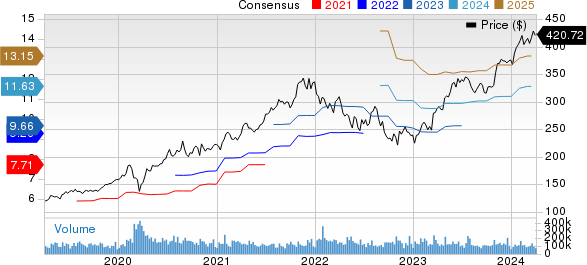Microsoft MSFT and OpenAI are reportedly teaming up for an ambitious venture, recently revealed by The Information. This partnership aims to establish a revolutionary data center project valued at an astonishing $100 billion. At the heart of this endeavor lies the creation of an artificial intelligence (AI) supercomputer dubbed Stargate, anticipated to make its debut in 2028.
The proposed project shines a light on the increasing demand for AI data centers capable of handling intricate tasks that traditional data centers cannot manage. With the rapid growth of generative AI technology, there is a pressing need for advanced infrastructure to support these developments.
The envisioned supercomputer, to be located in the United States, represents the culmination of a series of supercomputers planned for construction over the next six years. Stargate, positioned as the fifth phase of development, follows a smaller fourth-phase supercomputer set to be rolled out around 2026.
This project carries significant financial implications, with projected costs exceeding $115 billion, tripling Microsoft’s capital spending from the previous year due to bottlenecks in the supply of high-performance GPUs essential for AI model development. These chips, in high demand and often priced steeply, are critical for the enhanced computational capabilities required for advanced AI operations.
Microsoft Corporation Price and Consensus
The partnership between Microsoft and OpenAI is not the only blend of forces in the tech industry. Collaboration between chip companies like Nvidia NVDA, coupled with the development of customized computing chips, showcases a multi-faceted strategy to ensure project success. Additionally, the project is designed to accommodate chips from diverse suppliers, ensuring operational flexibility and efficiency.
Leading the chip sector, Nvidia faces challenges in meeting the exponentially growing demand. Nvidia’s latest AI chip, the Blackwell B200, carries a price tag ranging from $30,000 to $40,000 per unit. This platform features GB200 NVL72 with 72 Blackwell GPUs and 36 Grace CPUs interconnected by fifth-generation NVIDIA NVLink, accelerating inference workloads for resource-intensive and multi-trillion-parameter language models.
Advanced Micro Devices AMD ventures into new accelerators and processors for AI with its MI300 series chips. AMD’s MI300X chips have enabled the company to gain market share by competing with Nvidia’s popular H100 series chips used in training large language models like OpenAI’s GPT chatbot. Intel Corporation INTC has introduced the Intel Core Ultra featuring the neural processing unit, delivering power-efficient AI acceleration with 2.5x better efficiency compared to the previous generation.
In a recent move, Microsoft introduced two new devices, the Surface Pro 10 and Surface Laptop 6. These AI-driven PCs cater specifically to business requirements, incorporating Copilot integration and cutting-edge hardware specifications like Intel Core Ultra processors and Neural Processing Units for enriched AI experiences.
Microsoft further committed $650 million to procure a license for Inflection AI’s artificial intelligence software and welcomed the startup’s co-founders, Mustafa Suleyman and Karén Simonyan, to join their team. As part of the acquisition, Microsoft will also absorb Inflection AI’s 70 employees. The company will pay $620 million for licensing Inflection’s AI models and about $30 million to waive any legal rights concerning the mass hiring.
Shares of the company have surged by 11.9% compared to the Zacks Computer & Technology sector’s growth of 11.4% year to date. This Zacks Rank #2 (Buy) company expects fiscal third-quarter 2024 Intelligent Cloud revenues to range between $26 billion and $26.3 billion. Explore today’s Zacks #1 Rank (Strong Buy) stocks here.

